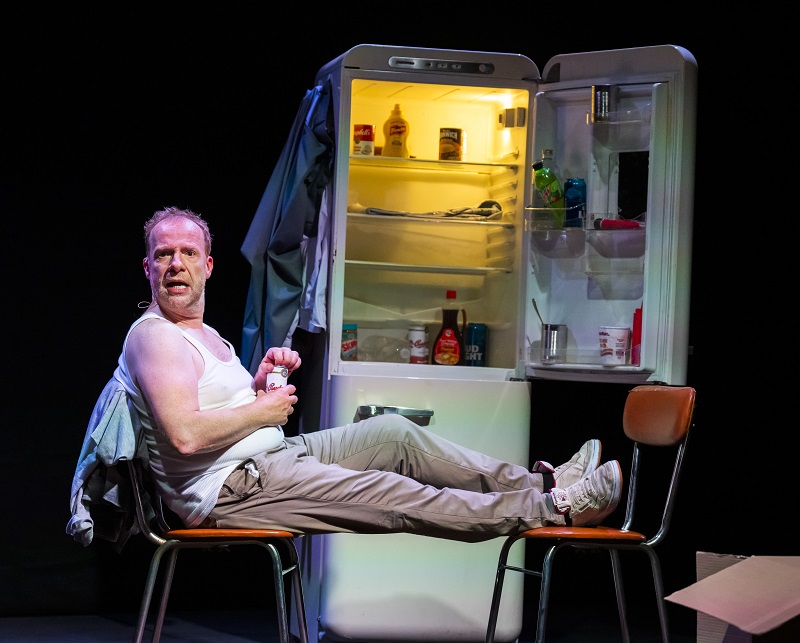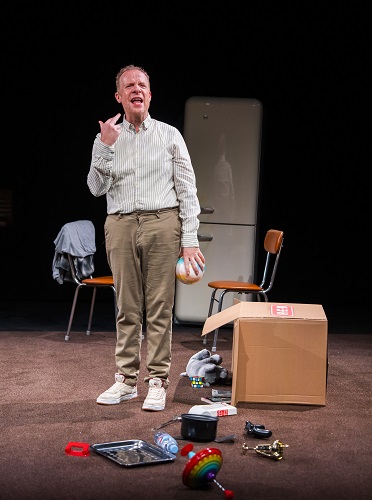“Sarah”, Coronet Theatre
Tom Bolton in north London
24th November 2022
A middle-aged man steps up to a spot-lit microphone on a dark stage. He starts a routine, but his humour is dark to the point of obliteration. “I was the best drunk driver in the world!”, he declares, and spins an anecdote about driving as fast as he can while drinking gin from a water bottle, and not just getting away with it, but loving it. His two young children sit terrified and forgotten in the back seat as he speeds through traffic, inches from death. It is an authentic alcoholic’s tale, sentimental and entirely self-centred, but transformed in the telling if, just for a moment, we can buy into the drinker’s mindset. His name is Scott, and the fact he is telling us this at all hints at some sort of redemption. He may be alive, but this is not a redemptive story.

Jonathan Slinger as Scott.
Photo credit: Tristram Kenton.
Scott McClanahan’s novel The Sarah Book has been adapted and directed by Oliver Reese, Artistic Director of the Berliner Ensemble, last seen at the Coronet Theatre in 2020 with his adaptation of Günter Grass’s The Tin Drum. The Coronet’s own Artistic Director, Anda Winters, has built an intriguing partnership with Reese and persuaded him to adapt the novel for the stage. McClanahan, from West Virginia, is hot indie property and his work lauded for its raw but funny prose about the realities of American life. Reese has turned the book into a 90-minute one-man show. Performed by Jonathan Slinger, it has its own unmistakable flavour – a queasy, disconcerting experience, in which every laugh is tempered with horror while the darkness threatens to swallow Scott at any moment.
The setting is the American South, a couple of hours from Charleston. This is the only geographical information we acquire in the course of the evening, as everything takes place in an endless succession of parking lots, Walmarts, and drive-in burger joints – a void where a society should be. Scott’s marriage, to high school sweetheart Sarah, is falling apart because of his provocative drinking. He recounts his behaviour in excruciating detail, smashing the family computer in front of Sarah after she finds his porn search history; sleeping in his car surrounded by drug deals; spitting on Sarah’s new boyfriend’s flash car. His life is a series of rock bottoms and there is very little to laugh at, but this does not stop Scott. He layers his account with gross-out humour – stories that focus on piss, shit, vomit, the habits of a repulsive dog. He seems to see what he considers the ugliness of life that we ignore. “I’m a horrible person,” he tells us. “And so are all of you, sometimes.”

Jonathan Slinger as Scott.
Photo credit: Tristram Kenton.
Reese’s direction, like his adaptation, is confident. He uses the accumulating junk of the set, which fills with crushed cans and detritus as Scott descends through mounting layers of chaos. The scenery consists of simple props – such as a carpet rolled out to become an apartment. Scott pulls costumes from a fridge freezer, changing on stage between scenes, pulling costume after costume from its shelves and discarding each one. The subtle use of music, from bluegrass banjo to moody slide guitar, builds atmosphere without ever overwhelming it.
Slinger relishes a challenging part, playing the role in a Virginian accent and occupying the stage throughout. He treads a fine line between charm and neediness, elation and sentiment, and utter selfishness. He seems dowdy and unremarkable but his face cracks into an impossibly wide grin, like the ghost of his RSC Richard III. Then the smile vanishes, leaving nothing. His performance is layered and slippery, and he keeps the audience guessing. We never feel we have a handle on who he really is, or why we are listening to a man who destroys everyone around him.
Slinger is highly compelling, but the uncertainty at the heart of the script limits the show’s success. Scott’s character is very hard to like, despite his relentless attempts to make us complicit in his story. He relates his despair to the parade of loss that is non-negotiable for all of us but his charm convinces no one, and he is clearly in the business of self-delusion, so the audience is left questioning the value of his story. There is charm in flashbacks to the early days of his relationship with Sarah, before the drinking, but we only have Scott’s word for it. The script is also episodic, moving from set piece to set piece in a way that sometimes seems contrived. We may not believe Scott, but we have to believe in him to be fully invested in his story – especially when he claims to be telling us something about ourselves.
The Coronet is doing us all a big favour by bringing exciting practitioners and ambitious programming to one of London’s best, most characterful spaces. Sarah is a sophisticated attempt to create drama that speaks to us, telling us things we do not want to hear. Scott’s greatest fear is boredom, but there is nothing boring about this flawed but fascinating show.









